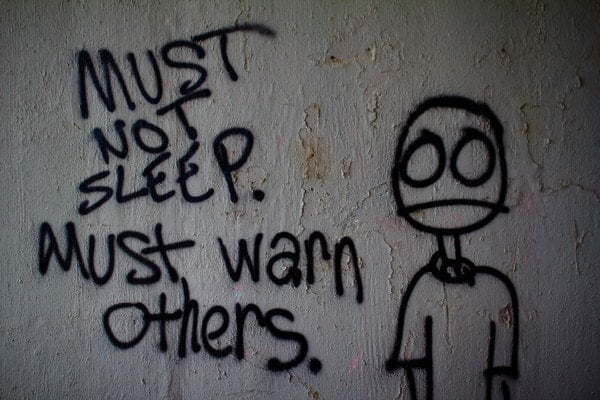
This website uses cookies to improve your experience. We'll assume you're ok with this, but you can opt-out if you wish. Read More
The Next Round: What happens after you change your drinking?

Drinking too much can disrupt your sleep. If you rely on alcohol’s sedative qualities to get you to sleep, you will also know the downsides: waking up but not feeling refreshed, needing to pee frequently, feeling dehydrated, your heart pounding. This is how alcohol affects sleep – drinking makes you dream less and snore more. You don’t so much sleep as pass out.
But changing your drinking can upset your sleep too, at least in the short-term. Sleep disturbance is such a common side-effect when we change our drinking, it’s one of the reasons people most often cite if they start drinking again.
But there are good ways to deal with sleepless nights, and good reasons to tackle your relationship with alcohol, including by taking a Club Soda course to change your drinking. People taking our courses sleep better by the end of their first month, and you could too.
If you want a good night’s sleep, discover more with this article and webinar from Club Soda co-founder Laura Willoughby.
It screws your circadian rhythm! While you may fall asleep quickly after drinking, it’s also common to wake up in the middle of the night. Alcohol affects the normal production of chemicals in the body that trigger sleepiness when you’ve been awake for a long time, and subside once you’ve had enough sleep. After drinking, production of adenosine (a sleep-inducing chemical in the brain) is increased, allowing for a fast onset of sleep. But it subsides as quickly as it came, making you more likely to wake up before you’re truly rested.
It stops deep sleep. As the night goes on, you spend less time in this deep sleep and more time in the less restful, Rapid Eye Movement (REM) stage of sleep. This can leave you feeling tired the next day no matter how long you stay in bed. There is eight hours and a good eight hours!
It stops you breathing well (a polite way of saying you snore!) Alcohol relaxes the muscles in your body, which means the tissue in your throat, mouth and nose can stop air flowing smoothly, and is more likely to vibrate.
It makes you get up and wee… or gasp for water. When you drink more than usual, you may have to get up in the night to go to the toilet. And don’t forget that alcohol is a diuretic, which means you will sweat more, make yourself dehydrated, and wake up for lack of water.
It affects women more. Women get less sleep than men who are equally drunk, probably because women metabolise alcohol faster. This means that women reach the second (and less restorative) stage of sleep before men do.
In making big life changes by cutting back or quitting alcohol, having trouble sleeping or feeling drowsy can leave us tired and irritable, weakening our resolve. After a few weeks, the majority of people report that their sleep does get better and they feel much more rested. The ability to enjoy a full night’s sleep and return to a normal sleep pattern can be one of the first signs that you are settling into a more sober life.
Arianna Huffington’s book Thrive has a whole chapter on the importance of sleep, and how not getting enough reduces your emotional intelligence, self-regard, assertiveness, sense of independence, empathy, interpersonal relationships, positive thinking, and impulse control. I knew how alcohol affects sleep was important but I didn’t realise it was that important.
As alcohol leaves your system, your body will change. Remember, you are recovering from using a mind-altering drug that has affected your body, maybe for many years. There will be side effects, and some of them may affect your sleep. Read more about these so called PAWS symptoms.
You need to give your body what it needs to recover. And sleep is one of the key restorative tonics you can give it!
If you have changed your drinking and find yourself sleeping more, you’re not alone. There are a few reasons this might be happening.
Whatever else you do, don’t worry about your sleep. This only leads to more sleeplessness! It can take some time for your sleep cycle to sort itself out – I know it was three months for me before I really started to sleep well, so stick with it.
If you used alcohol as a coping mechanism for finding it hard to get to sleep, then you have to deal with the underlying issue. How alcohol affects sleep has been ongoing for you for many years. It can take the body a bit of time to adjust to a normal sleep cycle that is not chemically induced.
It may also mean you have begun to feel worry, feelings that booze may have blocked out. (I get quite anxious halfway to falling asleep and sort of have to start again.) And so you need to deal with that stress. There is something on your mind, and you need to deal with it – not because not drinking is having an adverse affect. Don’t let your internal saboteur trick you!
Remember most of all that your body knows how to sleep, and sometimes you just need to get out of your own way and let it happen.
Here are some tips for sleeping better. None of these ideas are foolproof, and you might need to experiment to see what works for you. But here are some ideas:
And finally, why not consider taking a course. Club Soda’s courses, like How to Drink Mindfully and How to Stop Drinking, can help you change your drinking. If you take our courses, we’ll invite you to keep track of your sleep – so we know that people who take our courses sleep better by the end of their first month. You could too. Why not sign up today to discover more?
This website uses cookies to improve your experience. We'll assume you're ok with this, but you can opt-out if you wish. Read More
| Name | Domain | Purpose | Expiry | Type |
|---|---|---|---|---|
| wpl_user_preference | joinclubsoda.com | WP GDPR Cookie Consent Preferences. | 1 year | HTTP |
| PHPSESSID | www.tickettailor.com | PHP generic session cookie. | 55 years | HTTP |
| AWSALB | www.tickettailor.com | Amazon Web Services Load Balancer cookie. | 7 days | HTTP |
| YSC | youtube.com | YouTube session cookie. | 55 years | HTTP |
| Name | Domain | Purpose | Expiry | Type |
|---|---|---|---|---|
| VISITOR_INFO1_LIVE | youtube.com | YouTube cookie. | 6 months | HTTP |
| Name | Domain | Purpose | Expiry | Type |
|---|---|---|---|---|
| _ga | joinclubsoda.com | Google Universal Analytics long-time unique user tracking identifier. | 2 years | HTTP |
| sbjs_migrations | joinclubsoda.com | Sourcebuster tracking cookie | 55 years | HTTP |
| sbjs_current_add | joinclubsoda.com | Sourcebuster tracking cookie | 55 years | HTTP |
| sbjs_first_add | joinclubsoda.com | Sourcebuster tracking cookie | 55 years | HTTP |
| sbjs_current | joinclubsoda.com | Sourcebuster tracking cookie | 55 years | HTTP |
| sbjs_first | joinclubsoda.com | Sourcebuster tracking cookie | 55 years | HTTP |
| sbjs_udata | joinclubsoda.com | Sourcebuster tracking cookie | 55 years | HTTP |
| sbjs_session | joinclubsoda.com | SourceBuster Tracking session | Session | HTTP |
| Name | Domain | Purpose | Expiry | Type |
|---|---|---|---|---|
| mailchimp_landing_site | joinclubsoda.com | Mailchimp functional cookie | 28 days | HTTP |
| __cf_bm | tickettailor.com | Generic CloudFlare functional cookie. | Session | HTTP |
| NID | google.com | Google unique id for preferences. | 6 months | HTTP |
| Name | Domain | Purpose | Expiry | Type |
|---|---|---|---|---|
| _ga_10XZMT03ZM | joinclubsoda.com | --- | 2 years | --- |
| AWSALBCORS | www.tickettailor.com | --- | 7 days | --- |
| cf_clearance | tickettailor.com | --- | 1 year | --- |
| VISITOR_PRIVACY_METADATA | youtube.com | --- | 6 months | --- |
Join Club Soda for 10% off your first order of drinks for UK delivery. Plus get our latest news and special offers for members to choose better drinks, change your drinking and connect with others.
If you get an error message with this form, you can also sign up at eepurl.com/dl5hPn